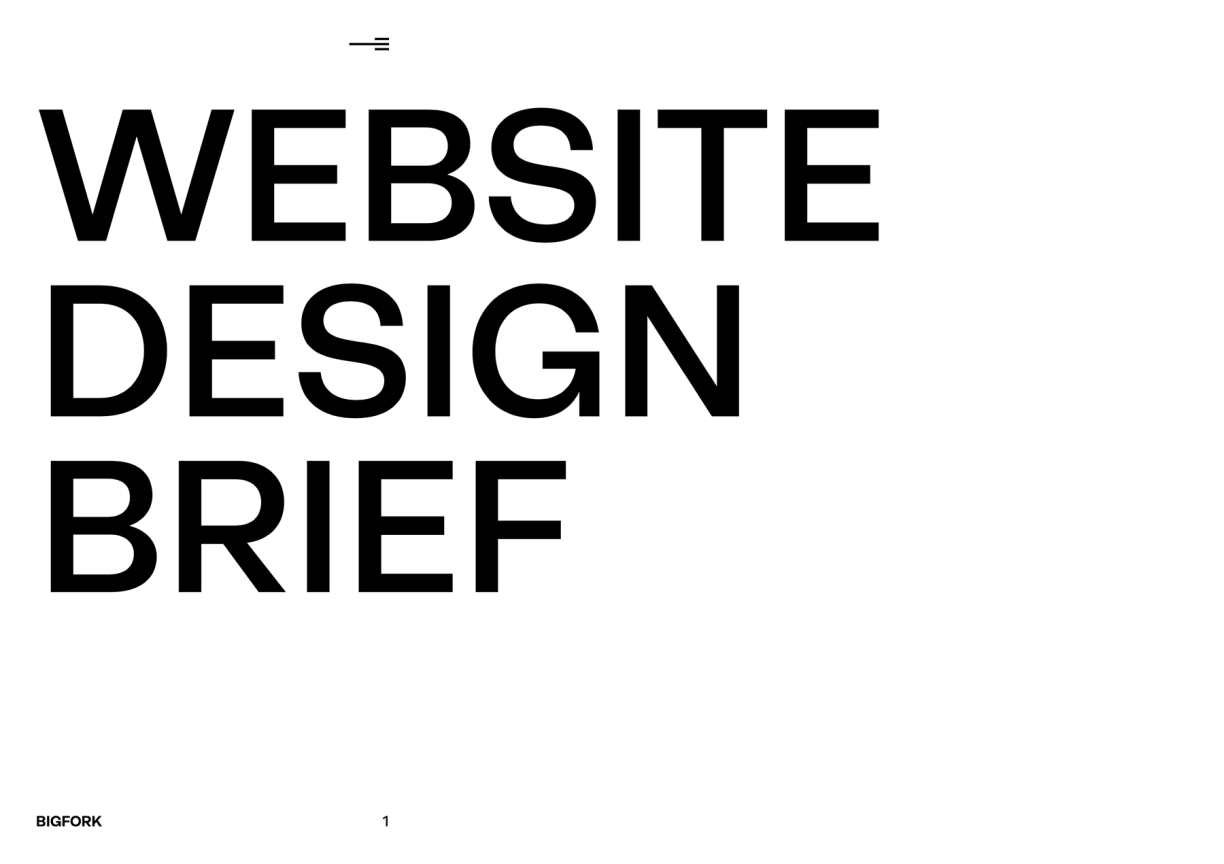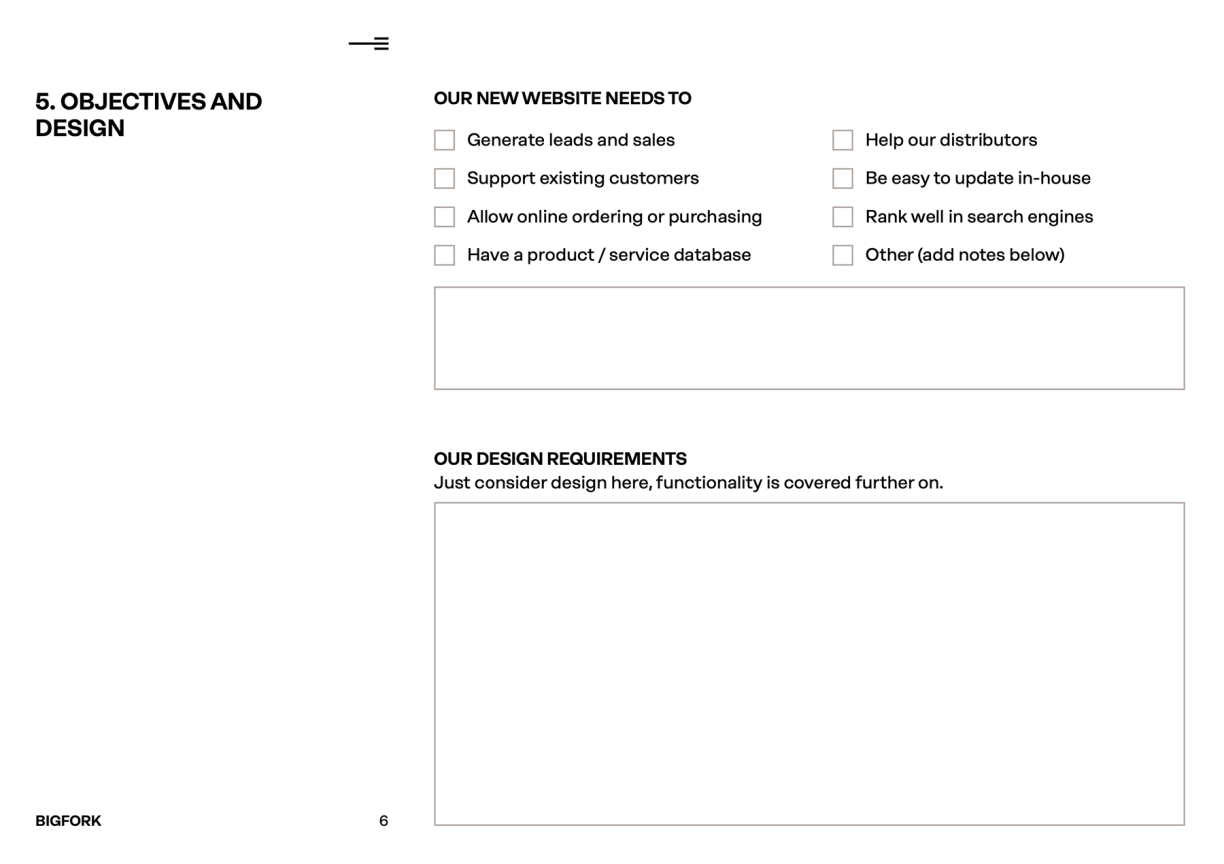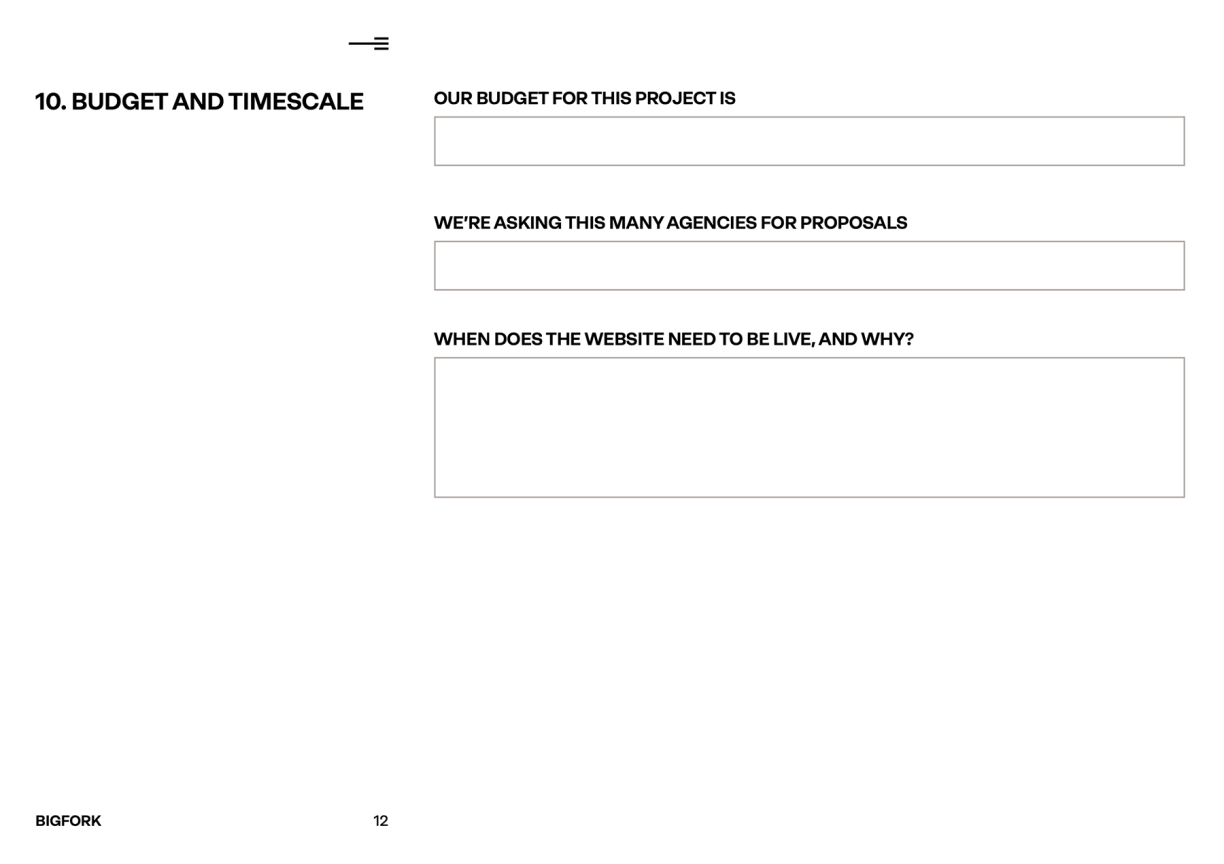
How to write a website design brief (+ Free PDF template)
Want to get started straight away?
Download your document
Please fill in your details for access to all our free downloads.
- Table of contents
- Why you need to write a website design brief.
- What are your website goals?
- 1. Your company background
- 2. Your branding
- 3. Competitors website analysis
- 4. Creative brief
- 5. Who is your target audience?
- Define your target audience for you new website.
- 6. Structure and content
- 7. What are your website development requirements?
- 8. Does your website need to meet accessibility standards?
- 9. Tracking your website performance
- 10. Hosting & Support
- 11. Budget
- 12. Timescale
- Website Brief FAQs
- Key takeaways
- Ready to turn your website design brief into reality?
Why you need to write a website design brief.
Writing a website design brief is an essential first step towards designing and building your new website.
Here we look at what your website brief should cover, what your web agency needs to know and the crucial questions to answer before you start.
A website design brief is simply a document that sets out what you want from your website design project.
It deals with areas including what the website will cover, how it will work, how you’ll update it and how people will find it.
A website design brief helps to focus your thinking on what you really need from your web design, so you don’t waste time and resources later on.
When you are choosing a web design agency, your brief also helps them understand what you want, resolve any questions and give you an accurate cost.
The better the briefing, the smoother the project – and the better the end result.
What are your website goals?
These days, every company is expected to have a website of some sort. But beyond that, why do you need a new one? What website objectives do you want to achieve?
Here are some typical examples of website goals:
- increase leads such as demo requests, subscriptions or quotes
- develop more brand awareness through engagement with video, white papers and articles
- support recruitment with more quality online vacancy applications
- differentiate from your competitors with a new design and messaging
- target new customers with product landing pages optimised for organic and paid traffic
- support existing companies with product downloads, training video and aftermarket support
- reduce costs with more information online, FAQs and livechat or chatbots
- discover more about your potential clients with surveys and feedback forms
- promote new products and services? Do you want to build your brand’s profile or offer people a better source of information?
It's important to ask the right people in your company what they want from the website.
Take an honest look at your existing website – or ask your customers, if you can. What do you like and dislike about it? What is working well, and what needs to change? Your website goals need to be agreed right at the start of your new website project.
Here are the main things your website brief needs to include in 2026.
1. Your company background
A website is a commercial tool – whether you’re using it to sell online, generate enquiries or just build your brand. So your agency needs to understand how your new website will fit with the rest of your business.
In your website design brief, sum up your company history, your products and customers, your markets, your strengths or weaknesses and your future plans.
What is your position within your marketplace? Are you a best-value option, a premium choice – or somewhere in between?
Look at your value proposition. This is the main message you need to communicate to your customers that sets you apart from your competition. For example:
- does your product have a benefit that few other companies can offer?
- is your customer service highly rated?
- perhaps your team has expertise no-one else has
- do you specialise in a specific industry (for example Bigfork specialise in B2B websites)
Value propositions such as 'market leaders' or 'established since xxxx' are very common, and we recommend avoiding them as they don't mean anything to your customers.
Do you have a marketing plan already? If so, let your agency know what part your new website will play in it.
2. Your branding
Outline your current branding assets in your website brief. Web agencies and designers will want to know what you have. This will help them work out how much design time is needed. Do you have full branding guidelines? It's good to send a copy of these to prospective agencies to accompany your brief.
Add a list of what brand assets you have in your brief such as:
- images and video
- logos
- tone of voice for copywriting
- marketing comms such as ads, print and events
Branding will play a key part of your new website to position your company correctly and help you differentiate from your competitors.
Website Brief Template
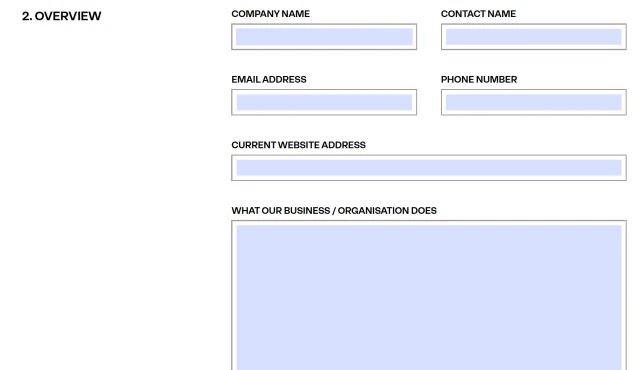
3. Competitors website analysis
Your website will be going toe-to-toe with your competitors – most obviously on Google’s search results page.
Therefore, your brief needs to include a review of competitors’ websites. Who are they? What are they doing well – and not so well? What opportunities does that open up for you? What are their key messages and product benefits? How does that compare to yours?
It's essential to carry out a competitor website analysis during the briefing stage or ask the agencies you're are asking to pitch to include it in their proposal.
4. Creative brief
As part of your website design brief outline your creative requirements for your website including branding, imagery and tone of voice. Your creative brief should detail how you want people to see your company and products.
Explain exactly what you like and don't like about your current website and other people’s sites – for example, the design, the functionality, the user journey. This helps your web design agency understand exactly what you’re looking for.
When you're talking to other web design agencies ask them how they think your current web design can be improved. They will have lots of experience that will be useful.
We strongly recommend that you do not ask web design agencies to submit speculative designs as part of your website design brief. To create an effective design, the agency will need to spend time with you to find out what design you need. Any speculative designs will be done quickly and without the right input needed.
5. Who is your target audience?
Your brief should profile your existing and future customers. Who do you want to visit your website? How do people normally buy from you? Who are your ideal new customers, and what would they want from your site?
Create personas for your best customers that shows what they are like and what content they would need from your website.
Then there’s the question of how visitors will find you. Will you aim for a first-page listing on Google, or direct traffic with pay-per-click (PPC) ads? What part will social media and email play? And what about offline channels like print advertising and events?
Define your target audience for you new website.

6. Structure and content
Now, think about what pages your website might need. Your agency will be able to help you here, but it’s good to have a basic idea.
For a smaller site, you can just list the pages. For larger sites, you might want to draw a ‘family tree’ style diagram (known as a ‘site map’), showing sections and links within the site.
Think about the content each page will feature. Remember, it doesn’t have to be just text – you can include images, video, documents, maps and more. Aim to give your users what is most helpful to them.
Detail in your brief what content you will be providing and what you need the web design agency to supply. If you need copy to be written then the agency knows they need to quote for this.
7. What are your website development requirements?
What specific functionality do you need on your website. For example do you need integration with a CRM such as Salesforce. Perhaps you need a product selector to help visitors find the right product.
For ecommerce sites, your agency will need to know what platform you prefer (if any), what products you want to offer, what functions you want and the arrangements for payment and shipping.
Your new website will probably need a Content Management System (CMS) so that you will be able to manage most of your website content inhouse. If you have a preferred CMS then add it to your brief, however it may be better to ask what CMS the agency would recommend and why.
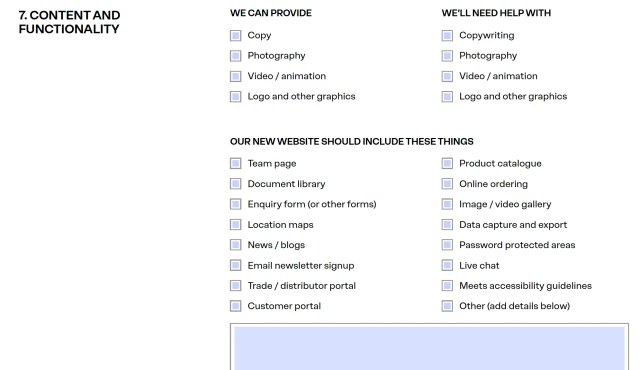
8. Does your website need to meet accessibility standards?
An estimate 16 million people in the UK are registered as disabled, with a spending power of over £270 billion per year. It makes business sense and good practice to make your website accessible to as many people as possible.
Designing your website to be accessible covers everything from the colours you use to the navigation tools you include. There are accessible standards you can ask your website to meet, the best known one being WCAG. Find out more about how to make your website accessible in our detailed article.
When briefing your website design agency, make sure you discuss accessibility and what experience they have in designing websites to meet WCAG standards.
9. Tracking your website performance
It's very important to add tracking to your website to make sure that it's meeting your website goals. GA4 (formerly Google Analytics) is the most commonly used tool to do this. Google Tag Manager is also an essential tool to use as well. When briefing your agency tell them what you want tracked on your website and if they are able to set this up.
10. Hosting & Support
Your website will need hosting and how your website is built will dictate what type of hosting you need. Talk to your existing web developers and web agencies you are briefing about web hosting and what they recommend.
Ongoing support on some level will be needed. Decide what level of support you need such as monthly support with technical issues CMS and development. We recommend asking web developers if they provide a Service Level Agreement and what this covers.
11. Budget
How much do you want to spend? This is a bit like saying ‘How long is a piece of string?’ But your agency needs to have some idea of your budget, so they can tailor their proposal.
If you need help deciding on a budget then ask web design agencies what budgets they tend to work to. Our article "How much does a website cost?" will give you an idea of what budget you will need.
With websites, you get what you pay for. Think of your website as an asset that you’re investing in, not just a cost. It will be a central part of your sales and marketing effort for many years to come.
12. Timescale
If you have a timescale, let your agency know up front. A large website can take several months to develop, particularly for a smaller team.
Download our website briefing PDF template. It's an ideal example of a website brief document that asks all the right questions for you to complete and send out to your list of web design agencies.
Website Brief FAQs
How many web agencies/designers should I send my web brief to?
To avoid wasting too much time, it's best to research and talk to website agencies and designers first, and then shortlist 3 or 4 to send your brief to.
How long should it take to write my website brief?
It's worth putting the time in and talking to everyone involved which should take 3-4 weeks. The better the brief the better the end result.
Who should write our website brief?
We recommend that the person or team managing the website should write it. Normally this would be the person in charge of marketing or sales. In a small company it would probably be the business owner.
How long does a web design brief need to be?
There is no limit on how long your brief should be. We recommend making it concise and detailed, so that you get the best results.
Key takeaways
- Start with clear goals - Define specific objectives (leads, brand awareness, recruitment) before anything else.
- Know your business inside out - Include company background, value proposition, and market position in your brief.
- Research your competition - Analyse competitor websites to identify opportunities and differentiation points.
- Define your audience - Create detailed customer personas and map out how they'll find and use your site.
- Plan your content strategy - Outline required pages, functionality, and who's providing what content.
- Consider accessibility - Factor in WCAG standards to reach the widest possible audience.
- Set realistic budgets and timelines - Treat your website as an investment, not just a cost.
- Plan for the long term - Include hosting, tracking, and ongoing support requirements.
Ready to turn your website design brief into reality?
As an experienced B2B website design agency, Bigfork can translate your website design brief into a beautifully designed, fully functioning website. And if you don’t yet have a brief, we can help you develop one. Find out more about our approach to website design, or get in touch.
This article was published on and last updated on , filed under strategy and planning, website design.
The Forkcast
Not your average B2B newsletter. Spice up your inbox with The Forkcast.

